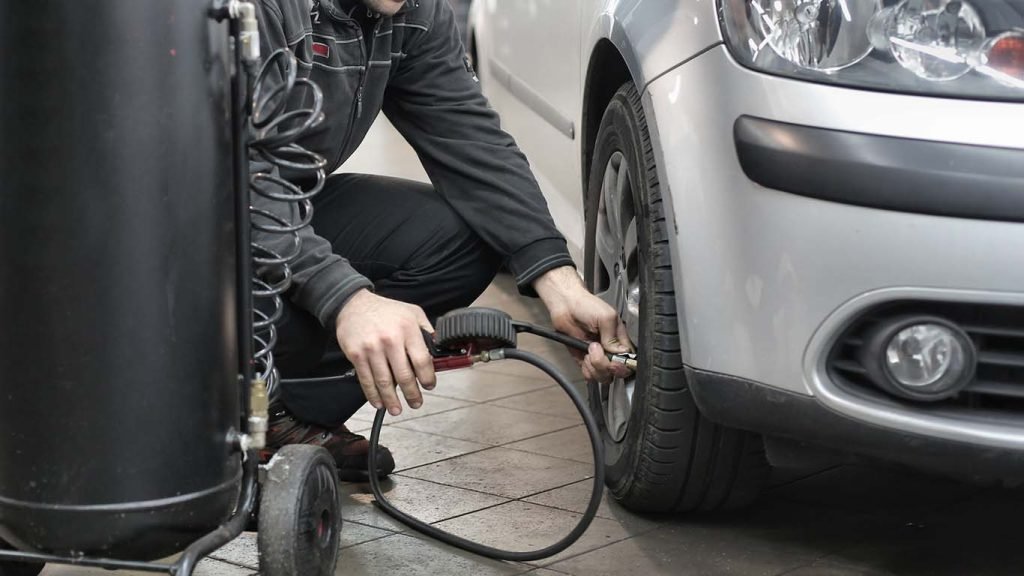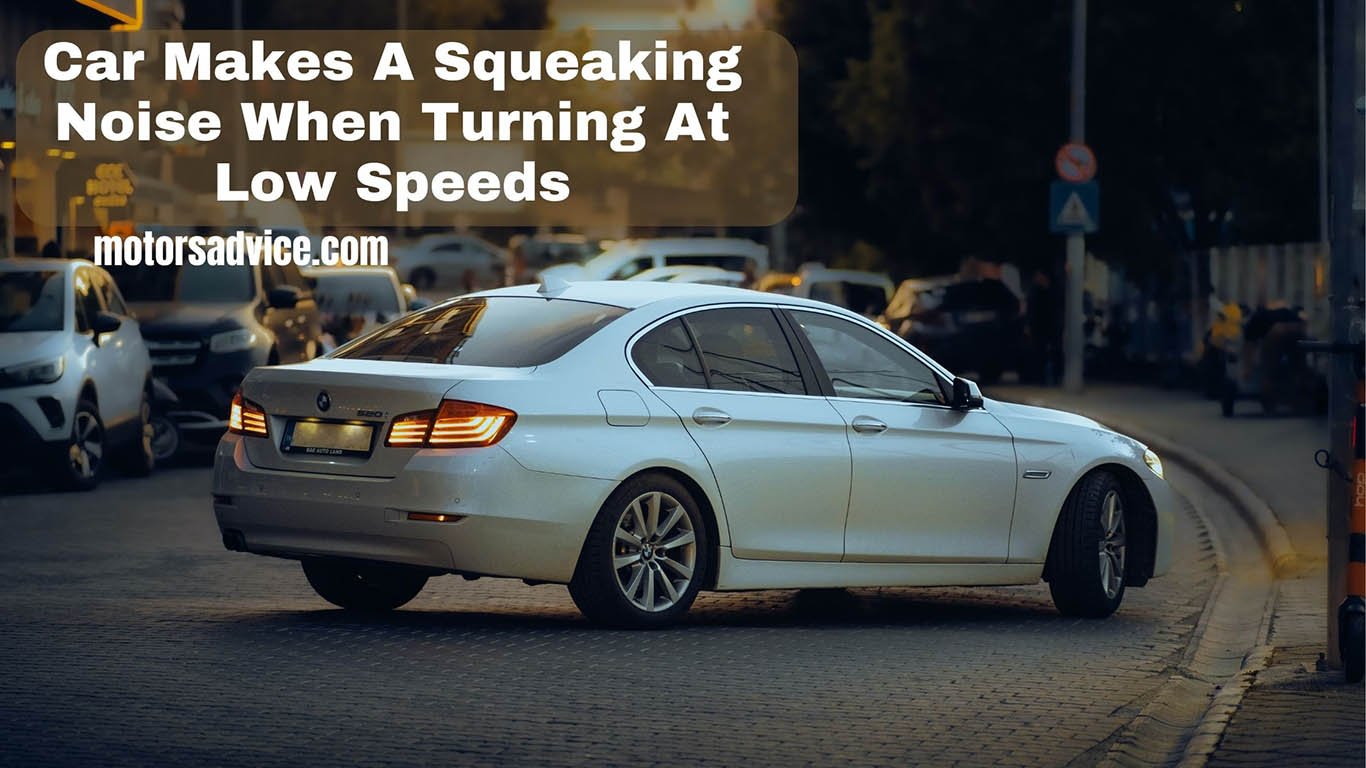If you happen to observe that your vehicle now produces a squeak while turning, you might be dealing with three usual suspects: insufficient lubrication within the suspension system, depleted power-steering fluid, or rubbing occurring between the steering wheel housing and the interior trim. But that’s not it; there could be more reasons for a car to make a squeaking noise when turning at low speeds.
Squeaking noise when turning at low speeds – Causes and Possible fixes
A Low Power Steering Fluid:
A potential reason for car squeaks when turning at a low speed could be the depletion of power steering fluid. The power steering system, which employs hydraulic pressure, enables smooth wheel turning. Inadequate fluid might result in a squeaking noise while steering.
How to fix:
Inspect your power steering fluid level and add more if needed to address this problem. If the concern persists even after adding fluid, consider flushing the system.
Bad CV Joint:
A faulty CV joint could be a potential culprit for the low-speed squeaking during turns. This joint plays a crucial role in your car’s suspension, enabling two moving components to operate smoothly without constriction.
If these joints wear down or get harmed, their ability to move unhindered diminishes, resulting in a noticeable screech when maneuvering the steering wheel.
How to fix:
To resolve this car problem, examining the CV joint and considering a replacement is advisable. It will make sure the car does not make a squeaking noise when turning at low speeds.
Tire Pressure:
Per the manufacturer’s guidelines, proper tire inflation is essential for seamless low-speed turns. Before hitting the road, make sure your tires are correctly inflated, guaranteeing peak performance from all four wheels. This minimizes vibrations and curbs unnecessary friction, which are common culprits behind the bothersome noises that can emerge during slow cornering. Here’s how you can check your car’s tire pressure is right.

How to fix:
Ensure your tire pressure is appropriately balanced—neither too low nor overly inflated. Reevaluate this adjustment when the vehicle has cooled down, as this will yield the most precise pressure.
Worn Brake Pads:
Worn brake pads and aging brakes might be the culprits behind those unwelcome sounds that emerge when maneuvering through bends at a gentle pace. When brake pads lose their grip on the rotors, the result can be heightened vibrations, resonating through various parts such as fenders or struts.
These vibrations harmonize into an unmistakable squeal, especially noticeable when softly engaging the brakes while navigating curved roads.
How to fix:
Make sure to change the brake pads on a regular basis as recommended by the manufacturer. Here’s how you can do it yourself.
Also, read why my car shakes when starting.
Worn Out or Damaged Power Steering Belt:
The power steering belt is vital in ensuring your steering is effortless. Yet, extended usage makes it susceptible to wear and tear, potentially causing a distinct noise. This sound, often resembling a squeak or a screech, tends to become prominent during slow turns in your vehicle.
How to fix:
If you notice the belt displaying indications of usage and deterioration or if it’s in a compromised state, you might need to think about getting a new one. If the belt is not as tight, you could fix the problem by making some adjustments. Given this task’s intricacy, seeking a mechanic’s assistance could be a prudent choice.
Failing Power Steering Pump:
The power steering pump has a crucial job of creating ample pressure to facilitate smooth vehicle turning. A declining pump could lead to sporadic power steering operation, leading to that annoying squeak during wheel turns.
Take a moment to observe the pump’s sounds when your car’s engine is running. If you detect a distinct whine, it could very well be the source of that pesky squeak.
How to fix:
Due to its intricacy, the power steering pump might require maintenance or substitution, which typically demands an expert touch.
Worn Suspension Bushings:
Suspension bushings, those small rubber parts, are vital in providing a cushion for your vehicle’s suspension setup. As time goes by, these bushings might experience wear and tear, leading to various problems—among which is the emergence of unwanted car squeaks while driving, especially low-speed turns.
How to fix:
Should the bushings show signs of wear and tear, a replacement becomes necessary. Executing this task can be quite challenging and might mandate the use of specialized equipment. Opting for a skilled technician is often the wisest choice in such scenarios.
Rubbing Against Interior Trim:
When you’re the proud owner of a new ride, there’s a chance you might notice some squeaks and squeals cropping up. These sounds could arise due to the steering wheel housing interacting with the interior trim. Particularly in warmer conditions, the materials tend to stretch out, effectively closing up any gaps, which might lead to these audible disturbances.
How to fix:
Consider visiting your nearby auto shop or vehicle repair center for the optimal solution.
Driving on Certain Surfaces:
Your vehicle’s tires might occasionally produce unwanted sounds upon encountering specific road textures. Regrettably, there’s minimal recourse in such situations. Just crank up the radio’s volume and continue your journey!
Squeaking Noise When Turning at Low Speed – When to Seek Professional Help
Taking care of car issues occasionally works as a DIY project, yet instances arise where a skilled mechanic’s expertise becomes indispensable. Recognizing the appropriate moment to seek assistance is crucial. Here’s a straightforward manual:
- You’re Not Sure What’s Wrong
If you’ve completed the inspections we discussed, yet uncertainty remains regarding the source of the squeak, it’s advisable to consult an auto technician. These professionals possess specialized equipment and expertise to swiftly and precisely diagnose the issue.
- The Fix Is Too Complicated
Certain replacements, such as the CV joints or the power steering pumps, can be intricate. If you lack the assurance or proper equipment, entrusting the task to a skilled expert is the wiser choice.
- The Noise Is Getting Worse
Should the squeaking sounds amplify or increase in frequency, don’t delay; promptly visit an auto professional. This could indicate a significant issue, potentially harming your vehicle’s integrity or jeopardizing its roadworthiness.
Always recall seeking assistance is a wise choice. Mechanics possess the expertise to rectify car concerns and use appropriate equipment for secure solutions.
Wrapping it up
Managing a car that produces squeaking noise while turning at lower speeds might be inconvenient, but always remember that you don’t have to face this situation in isolation.
Solutions exist for a depleted power steering belt, a struggling power steering pump, CV joints in need of repair, insufficient power steering fluid, or tired suspension bushings. Certain remedies can be executed at your own convenience, yet some are more suited for expert attention. Don’t shy away from seeking assistance whenever necessary.
A properly functioning, noiseless vehicle not only grants calmness but also guarantees a seamless and secure journey.
Car Makes Squeaking Noise When Turning at Low Speeds – FAQs
Is Squeaky Suspension Dangerous?
Absolutely, dealing with a squeaky suspension demands prompt attention. Consulting an experienced mechanic without delay is crucial. Their expertise will ensure any potential harm or safety risks are averted.
Unsettling sounds emerging from the suspension system often result from worn components like control arms or ball joints. Expert mechanics excel at pinpointing the replacements required and effectively resolving the matter.
How Risky Is A Squeak When Turning?
A slight squeaking noise when turning at low speeds might be a cause for concern, as it could signal a potentially significant issue with either the steering column or the suspension setup, requiring prompt attention.
If you notice the sound exclusively happening during low-speed turns, it might result from aged components within the suspension mechanism or unsecured external trim components. It’s advisable to tackle these concerns promptly to guarantee your vehicle’s secure and dependable functioning. Ignoring these matters could result in diminished performance and handling and jeopardized safety.
Do wheel bearings make a noise at low speeds?
Vehicle suspension relies on wheel bearings for seamless wheel rotation. A frequent indicator of faulty bearings is a chirpy or squeaky sound tied to how fast the vehicle moves.
Though this sound is commonly linked with increased velocities, it’s feasible for wheel bearings to produce a squealing sound at lower speeds, too. If the auditory experience entails a consistent squeak or chirp originating from your wheels, seeking prompt attention from a skilled mechanic is crucial. This step aids in identifying the underlying problem swiftly, thereby averting potential harm to your automobile.
